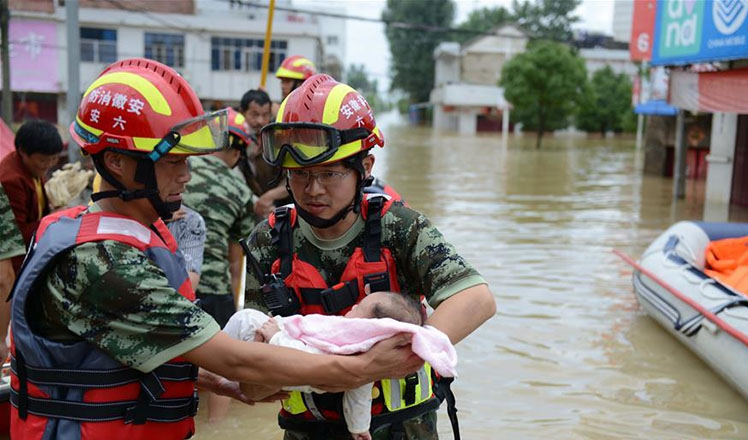Italian expert: China has the right to not participate
Updated: 2016-07-11 14:00
By Tullio Treves(chinadaily.com.cn)
|
||||||||
Non-participation by China in the arbitral proceedings has raised particular attention in light of the discussions among scholars whether there is a duty to appear or, on the contrary, an absence of such duty or even a right to non-appearance.
In the Statute of the International Court of Justice as well as in Annexes VI and VII of UNCLOS, no duty to appear is mentioned. Similar to corresponding provisions of the Statute of the ICJ and of the International Tribunal for the Law of the Sea, Article 9 of Annex VII of UNCLOS, applicable to arbitrations such as the Philippines vs China one, states:
"If one of the parties to the dispute does not appear before the arbitral tribunal or fails to defend its case, the other party may request the tribunal to continue the proceedings and to make its award. Absence of a party or failure of a party to defend its case shall not constitute a bar to the proceedings. Before making its award, the arbitral tribunal must satisfy itself not only that it has jurisdiction over the dispute but also that the claim is well founded in fact and law."
Based on this and similar provisions, the consequences drawn from non-appearance by international courts and tribunals aim at balancing the positions of the two parties, by permitting the continuation of the case and by avoiding detriment to either party. It would seem correct to say that non-appearance is a mere possibility, a fact on which no value judgment is expressed, from which the applicable provisions draw certain consequences. In legal terms it may be said, in my view, that a party to a dispute has a right not to appear, and that, when it exercises such right it is pursuing a perfectly legitimate procedural course of action in light of the consequences, positive and negative, well known to it, provided for in the applicable provisions.
Negative remarks on the legality of non-appearance are not to be found in the judgments of international courts and tribunals or in the Philippines vs China 2015 award. The most that emerges in this sense from jurisprudence are mentions of "regret" or invitations to take into account a "duty" to cooperate with the court.
The only case of non-appearance in an arbitration under UNCLOS Annex VII — the same procedure as in the Philippines vs China — is no exception. This was the Arctic Sunrise case submitted by the Netherlands against Russia, which decided not to participate in the proceedings. While remarking that Russia's absence had "deprived the tribunal of the benefit of Russia's views on the factual issues before it and on the legal arguments advanced by the Netherlands", the arbitral tribunal confirmed that "non-participation by a state party in any of the compulsory procedures entailing binding decisions provided for in Section II of Part XV of UNCLOS, including arbitration, affects neither the jurisdiction of the tribunal in question nor the binding nature of any final decision rendered by that tribunal".
In the provisional measures phase of the Arctic Sunrise case, which was held before the International Tribunal for the Law of the Sea, two judges strongly criticized Russia's decision not to appear. In a separate opinion, they stated that, "non-appearance is contrary to the object and purpose of the dispute settlement system under Part XV of UNCLOS" and that:
"Judicial proceedings are based on a legal discourse between the parties and the cooperation of both parties with the international court or tribunal in question. Non-appearance cripples this process."
These views have not found an echo in the Order on Provisional Measures issued in 2013 by the International Tribunal for the Law of the Sea. Thus, the tribunal rejects the view that there is a duty to appear and concurs with the view that there is a right not to participate, or at least, that non-participation is a fact to which no value judgments attach, and from which the International Tribunal on the Law of the Sea Statute draws certain consequences.
It seems particularly noteworthy that, notwithstanding the presence of one of the two above-mentioned judges as an arbitrator in the Philippines vs China case and that the tribunal's attention was drawn in pleadings by the Philippines' advocates on the judge's position during the hearing, in the award there is no mention of the position held by this judge in his separate opinion, or of the views put forward in it. This seems support for the view that the tribunal rejects the opinion that there is a duty to appear, and that it endorses the position, held by China, that non-appearance is a right or at least a factual situation to which no value judgment attaches.
At a formal level China's non appearance was treated as a right. The Tribunal viewed China's attitude with respect and did not even indulge in discussing views, which are present in some scholarly writings, and also, as we have seen, in an opinion of one of its members, that non-appearance is a violation of the duties of a party to a dispute. Since the beginning of the case, the tribunal made an effort to treat the parties equally and to analyze all issues in order to satisfy itself of its jurisdiction. However, the effort to guess the positions China might have taken and the constant stimulation exercised by the tribunal on the Philippines in order to make it further elaborate on issues the tribunal considered as interesting, might have put China in a position of disadvantage.
The author is emeritus professor, University of Milan, Italy, a former judge of the International Tribunal for the Law of the Sea, and senior public international law consultant, Curtis, Mallet-Prevost, Colt & Mosle LLP. The article is a summary of a section of an opinion prepared upon request of the government of the People's Republic of China.
- Arbitral court not best place for South China Sea dispute settlement: Croatian law expert
- South China Sea arbitration to set 'serious, wrong and bad example': Chinese ambassador
- US atlas shows South China Sea islands part of Chinese territory
- Diplomat reaffirms China's South China Sea stance
- Ambassador Liu Xiaoming gives interview to Reuters on the South China Sea
- US focus has shifted from Middle East to the South China Sea
- Cold war mentality lingers in South China Sea arbitration
- China, US need to manage differences over South China Sea: experts
- South China Sea: How we got to this stage
- Dai Bingguo: China not to be intimidated, even if US sends 10 aircraft carriers to South China Sea
- Eid al-Fitr celebrated worldwide
- Swedish PM looking at tightening laws after festival sex attacks
- British PM race cut to 3 hopefuls as 2 contenders exit contest
- Chinese herbalists offer free US treatment
- Obama praises Hillary's judgement hours after FBI's censure
- Rio mayor tells Olympic visitors: 'Don't expect New York or London'

 Griezmann scores twice to lift France into Euro final
Griezmann scores twice to lift France into Euro final
 Life goes on in flooded Wuhan
Life goes on in flooded Wuhan
 Paper cutouts offer a new view of world landmarks
Paper cutouts offer a new view of world landmarks
 Animals occupy Shanghai
Animals occupy Shanghai
 Beijing Muslims mark end of Ramadan
Beijing Muslims mark end of Ramadan
 Remember emerging heroes in China's floods
Remember emerging heroes in China's floods
 Ronaldo powers Portugal into Euro 2016 final
Ronaldo powers Portugal into Euro 2016 final
 Culture Insider: Six things you may not know about Minor Heat
Culture Insider: Six things you may not know about Minor Heat
Most Viewed
Editor's Picks

|

|

|

|

|

|
Today's Top News
Ministry slams US-Korean THAAD deployment
Two police officers shot at protest in Dallas
Abe's blame game reveals his policies failing to get results
Ending wildlife trafficking must be policy priority in Asia
Effects of supply-side reform take time to be seen
Chinese State Councilor Yang Jiechi to meet Kerry
Chinese stocks surge on back of MSCI rumors
Liang avoids jail in shooting death
US Weekly

|

|









